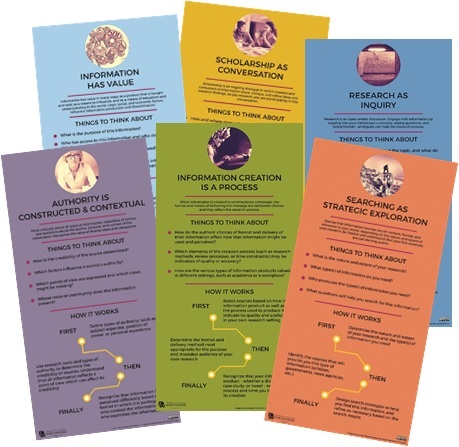Andersen Library’s Featured Resource blog installments usually point our patrons to a research database, a particular library collection, a library space or technology resource. One purpose of these posts is to ensure our UW-W students, faculty and staff are aware of the vast array of resources available to them as Andersen Library patrons. After all, these resources are selected after much consideration as to whether they align with the Mission and Goals of the Library, and in turn, the University. Selecting these resources and promoting their use is just the beginning. The work continues as we “promote information literacy at the University of Wisconsin-Whitewater by providing instruction in effective access, evaluation, organization, synthesis and application of information from a variety of sources and formats in a variety of contexts” (UW-W Andersen Library, Goal 6). We do this when we work with our patrons at the Reference Desk, when we respond to a question through our 24/7 Ask a Librarian chat service or email, and collaborate with course instructors on research instruction.
As other disciplines do, we look to research and professional guidelines to inform our work. In 2015, the Association of Colleges & Research Libraries introduced the Framework for Information Literacy for Higher Education. This framework shifts the emphasis of instruction and learning from skills-based objectives to essential concepts, dispositions and practices. These six “frames” guide us to develop a deep understanding of how information is created, shared, and valued within specific contexts:

- Authority Is Constructed and Contextual
- Information Creation as a Process
- Information Has Value
- Research as Inquiry
- Scholarship as Conversation
- Searching as Strategic Exploration
In order to make sense of these frames for our students and for our instruction, the Andersen Library Reference and Instruction Librarians have formulated model questions for each frame. These questions illustrate how understanding information within this framework guides the research process and our evaluation of information we find. For example, the frame “Authority Is Constructed and Contextual” leads us to question:
- How is the credibility of the source determined?
- Which factors influence a source’s authority?
- Which points of view are expressed and which views might be missing?
Rather than simply learning to efficiently navigate a specific database or how to properly format a citation (both which may be essential, and neither of which is necessarily simple), the Framework for Information Literacy prompts us to ask questions as we seek and work with information. The questions we ask are those which both lead us to become and demonstrate us to be information literate. The Framework describes what it is to be critical consumers of information in our discipline and in our daily lives.
We have designed posters illustrating each frame. These will be posted in the Library instruction spaces as reference and to remind us of our focus for information literacy teaching and learning. We invite you to view the complete text of our Information Literacy Framework posters – the Featured Resource for the month. Feel free to use and share these as guides to learning, teaching, and thinking about research.
